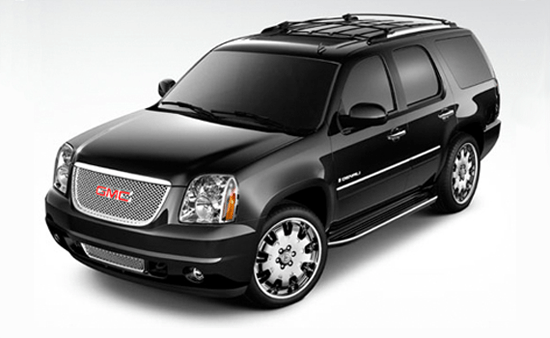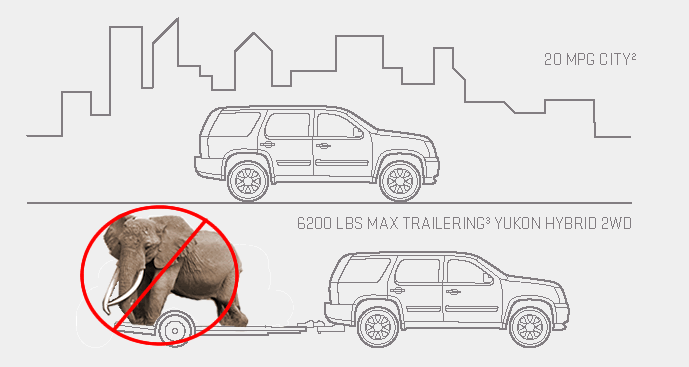Yukon Denali Hybrid or Why Not to Tow An Elephant

GMC's 2012 Yukon Denali Hybrid.
That’s right, a Yukon Denali Hybrid! If that sound like an oxymoron, that’s probably because it is. I happened upon this car while walking to work today, and saw one sitting at a light. The one I saw also had the words HYBRID glazed across the top 8-12″ of the window as well in a blue/grey font, which was what originally caught my attention. I think it was something about seeing a massive hunk of black automotive waste with a huge “HYBRID” label that caused momentary disorientation and confusion. How can that be a hybrid, I though to myself?
And since I can’t help my natural curiosity, I did a little digging into what this hunk of metal is all about. As it turns out, here’s the basic stats. The Yukon Denali Hybrid (4WD) comes in at an astounding $60,000! Ouch, talk about a pain in the rear. It has a hybrid electric engine that operates until about 25 or so mph, at which point the Vortec 6.0L VVT V8 engine kicks in, providing 332 Hp @ 5100 RPM and 367 Lb/Ft @ 4100 RPM.  That translates to nearly 6000 Lb of trailer towing hoohaw! One word of caution–don’t try towing your pet elephant Sissy with the Yukon, it just won’t work. (Luckily those clever engineers over at GMC foresaw this possible consumer problem, and included a handy warning in their promo materials against transporting elephants behind your car).
That translates to nearly 6000 Lb of trailer towing hoohaw! One word of caution–don’t try towing your pet elephant Sissy with the Yukon, it just won’t work. (Luckily those clever engineers over at GMC foresaw this possible consumer problem, and included a handy warning in their promo materials against transporting elephants behind your car).
You really get a sense of just how big the Denali is when compared to a real elephant, which should normally gulf a golf! Sorry, couldn’t resist that little near pun…and while you’re at it, did you know about the link between the color blue and elephants? Me neither. Pretty cool, huh.  Unfortunately, while most pachyderms are quite resourceful and well designed for their environment, the Yukon Denali Hybrid is anything but. Here’s the details from the GMC web site on the electric propulsion system behind this hybrid:
Unfortunately, while most pachyderms are quite resourceful and well designed for their environment, the Yukon Denali Hybrid is anything but. Here’s the details from the GMC web site on the electric propulsion system behind this hybrid:
300-Volt NICKEL-METAL HYDRIDE (NiMH) BATTERY PACK
NiMH battery technology can store a lot of energy in a small space. In fact, the 300- volt battery pack is strong enough to propel your Yukon from rest to over 25 mph on electric power alone, yet small enough to fit under the second-row seat between the steel frame rails. This leaves your cargo space and passenger capacity unchanged from other Yukons.
HYBRID ELECTRONICALLY VARIABLE TRANSMISSION
To conserve fuel at low speeds or under light loads, this transmission has two integral electronic motors that engage to give you smooth, effortless power. At highway speeds or heavier loads with its 6.0L V-8 VVT engine engaged, it acts as a normal automatic transmission.
So basically as long as you don’t carry any weight, or ever go over 25 Mph, this is a great hybrid car. After that, you get to the real nuts & bolts, the fuel economy. The highway mileage for the Yukon is 23 Mpg, and city driving is not much better at 20 Mpg. Compare that to something like the new Nissan Leaf, a fully hybrid electric car that can get 100+ miles per battery charge and close to 99 Mpg, and it’s hard to see what exactly is hybrid about the Yukon other than its name. For a contrary view about how great the Yukon hybrid is, check out this writeup at Hybrid Cars. At the end of the day I’m still not convinced this is any improvement. Yeah, it’s better than the straight gas Yukon (closer to 14/19 for city/highway MPG), but the point is, we don’t need these massive cars. And unlike one review that claims nearly 1 million Americans “need” this for stuff like hauling boats and kids around, my response is simple–you’re wrong. We did all this exact same stuff–hauling kids and gear-before there was even such a thing as an SUV. The logic behind this claim is pure affluenze–bigger is better, by god, and as an American I deserve it! No really, this is the line of argument behind these things, as you can read for yourself in some of the Hybrid Car comments…
Also, have you noticed our appetite for horsepower keeps going up? Used to be a pickup/large SUV would “only” get a 220+/- HP V8–now you can find them with over 350 HP! AND they are getting the same or better mileage-talk about amazing? I’m sure if you’d be happy with 220 HP, you could get a full-sized suv/truck that gets very good mileage. But the market seems to be MORE POWER! When was the last time you saw a manufacturer say, “We’ve reduced the power in this SUV for 2008.”? You don’t, because we Americans vote with our wallets, and right now we are buying higher-powered.
But the real devil is in the details here once again. According to the gov’s Fuel Economy website, the dirty secret about fuel efficiency is that there is none! Traditional gas powered vehicles waste 75% or more of their energy (ie. of the gas burned) in energy transfer and loss through things like the radiator and various engine components. So not only are these huge vehicles not even vaguely efficient, the whole idea of improving fuel efficiency is largely a joke when you’re only getting 15-25% actual energy conservation!
Only about 14%–26% of the energy from the fuel you put in your tank gets used to move your car down the road, depending on the drive cycle. The rest of the energy is lost to engine and driveline inefficiencies or used to power accessories. Therefore, the potential to improve fuel efficiency with advanced technologies is enormous.
So the next time you hear someone talking about how great their Yukon Denali Hybrid SUV is, just remember, bigger is not better, nor is it more efficient. That’s just auto industry hype. No matter how you look at it, these monster cars are bad news for the planet, the road and anyone unlucky enough to get in their way–unless of course you happen to be an elephant, in which case you’re probably ok. Until next time…
###


